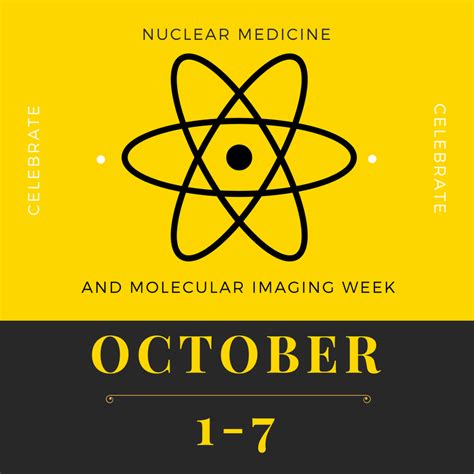Nuclear medicine technologists play a vital role in the healthcare system, and their contributions often go unrecognized. However, during Nuclear Medicine Technologists Week, we take a moment to appreciate the hard work and dedication of these individuals. From diagnosis to treatment, nuclear medicine technologists are the unsung heroes of the medical world.
The importance of nuclear medicine technologists cannot be overstated. They are responsible for administering radioactive substances to patients, operating complex imaging equipment, and interpreting the resulting images to help doctors diagnose and treat a wide range of diseases. From cancer to cardiovascular disease, nuclear medicine technologists are on the front lines of healthcare, providing critical support to patients and medical professionals alike.
Despite the importance of their work, nuclear medicine technologists often work behind the scenes, out of the spotlight. They are not always recognized for their contributions, and their role in the healthcare system is often misunderstood. However, during Nuclear Medicine Technologists Week, we shine a light on these dedicated professionals and celebrate their achievements.
The Role of Nuclear Medicine Technologists
Nuclear medicine technologists are highly trained professionals who specialize in the use of radioactive substances to diagnose and treat diseases. They work closely with doctors, nurses, and other medical professionals to provide high-quality patient care.
Some of the key responsibilities of nuclear medicine technologists include:
- Administering radioactive substances to patients
- Operating complex imaging equipment, such as positron emission tomography (PET) and single-photon emission computed tomography (SPECT) scanners
- Interpreting images to help doctors diagnose and treat diseases
- Providing patient care and education
- Maintaining equipment and supplies
Nuclear medicine technologists work in a variety of settings, including hospitals, clinics, and research institutions. They may specialize in specific areas, such as oncology or cardiology, and may work with a range of patients, from children to adults.

Education and Training
To become a nuclear medicine technologist, one must complete a formal education program in nuclear medicine technology. These programs are typically offered at the associate's or bachelor's degree level and include both classroom and clinical training.
Nuclear medicine technologists must also obtain certification or licensure to practice in their state. The Nuclear Medicine Technology Certification Board (NMTCB) offers certification in nuclear medicine technology, and many states require licensure to practice.
In addition to formal education and certification, nuclear medicine technologists must also complete continuing education requirements to stay current with advances in technology and medical practice.
The Benefits of Nuclear Medicine
Nuclear medicine has a range of benefits for patients and medical professionals alike. Some of the key benefits include:
- High-quality diagnostic images: Nuclear medicine provides high-quality images of the body's internal structures and functions, allowing doctors to diagnose and treat diseases more accurately.
- Minimally invasive: Nuclear medicine procedures are often minimally invasive, reducing the risk of complications and promoting faster recovery times.
- Personalized medicine: Nuclear medicine allows for personalized treatment plans, tailored to the individual needs of each patient.
- Cost-effective: Nuclear medicine can be a cost-effective alternative to other diagnostic and treatment options.

Challenges Facing Nuclear Medicine Technologists
Despite the many benefits of nuclear medicine, nuclear medicine technologists face a range of challenges in their daily work. Some of the key challenges include:
- Technological advancements: The rapid pace of technological change in nuclear medicine can be challenging for technologists to keep up with.
- Patient education: Educating patients about nuclear medicine procedures and treatments can be time-consuming and challenging.
- Radiation safety: Ensuring the safe use of radioactive substances is a top priority for nuclear medicine technologists, but can be challenging in certain situations.
- Staffing shortages: Nuclear medicine technologists may face staffing shortages, particularly in rural or underserved areas.
Celebrating Nuclear Medicine Technologists Week
During Nuclear Medicine Technologists Week, we celebrate the hard work and dedication of nuclear medicine technologists. We recognize their contributions to the healthcare system and express our gratitude for their service.
If you know a nuclear medicine technologist, take a moment to thank them for their hard work and dedication. If you are a nuclear medicine technologist, we salute you and appreciate all that you do.

Get Involved
There are many ways to get involved in Nuclear Medicine Technologists Week. Here are a few ideas:
- Share a message of appreciation on social media using the hashtag #NMTWeek
- Write a thank-you note to a nuclear medicine technologist
- Participate in a local event or celebration
- Learn more about the role of nuclear medicine technologists in the healthcare system
By getting involved, you can help raise awareness about the important work of nuclear medicine technologists and show your appreciation for their contributions.
Conclusion
Nuclear medicine technologists are the unsung heroes of the medical world. They work behind the scenes to provide high-quality patient care and support medical professionals in their daily work. During Nuclear Medicine Technologists Week, we celebrate their achievements and express our gratitude for their service.
If you are a nuclear medicine technologist, thank you for all that you do. If you know a nuclear medicine technologist, take a moment to thank them for their hard work and dedication.






What is nuclear medicine?
+Nuclear medicine is a branch of medical imaging that uses small amounts of radioactive substances to diagnose and treat diseases.
What do nuclear medicine technologists do?
+Nuclear medicine technologists administer radioactive substances to patients, operate imaging equipment, and interpret images to help doctors diagnose and treat diseases.
How do I become a nuclear medicine technologist?
+To become a nuclear medicine technologist, you must complete a formal education program in nuclear medicine technology and obtain certification or licensure to practice in your state.
